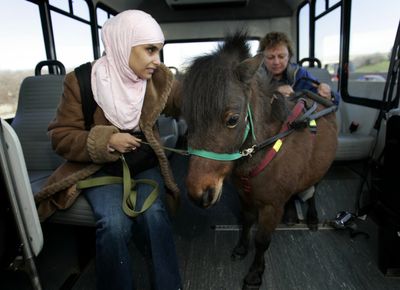Tiny horse learning to guide blind Muslim
Parents consider dogs unclean

DEARBORN, Mich. – Seeing-eye dogs are a nonstarter among many Muslims who consider the animals unclean, but a horse the size of a dog just might work.
“This is a really awesome little horse,” Mona Ramouni said last week as she put Cali, a 3-year-old miniature horse, through her paces and rode the bus to work with her for the first time.
Ramouni lost her sight to retinopathy – damage to the retina – that is a frequent side effect of premature birth. Until now, she has relied on her family to guide her around the Detroit suburbs where she’s lived, studied and worked for all of her 28 years.
Ramouni, a proofreader of textbooks in Braille, wanted more independence, but a traditional guide dog wasn’t an option. She’s an observant Sunni Muslim and respects her Jordanian-born parents’ aversion to having a dog in the home where she lives along with three of her six siblings.
The answer, she hopes, is Cali, short for Mexicali Rose. The former show horse stands about 2 1/2 feet tall and weighs about 125 pounds.
“I want a horse that will be a partner for the next 30 or so years. … What I really want is to be able to take her places and go places with her that neither of us ever would have been able to do without each other,” Ramouni said.
While most Muslims believe dogs can violate ritual purity, horses are seen as “regal animals,” said Dawud Walid, executive director of the Council on American-Islamic Relations’ Michigan chapter.
Still, “there would be concerns about bringing a horse into certain establishments and areas of worship as well,” he said.
There are only a handful of the miniature animals trained as guides for the blind in the United States. Cali’s trainer, Dolores Arste, knows of five others.
Ramouni paid for the horse, $450 a month for Arste’s training and other expenses out of her savings.
Since Ramouni had never used a dog, she had to learn how to control a guide animal. She was partially successful at training a pet dwarf bunny named Baylea – “she does come when I call her,” Ramouni said – and has worked hard with Cali.
“I’ve never met a young woman with so much dedication,” Arste said.
Arste trained Cali partly in Hatfield, Ark., and partly in Saratoga Springs, N.Y., teaching the horse how to get in and out of vehicles, guide through crowds and stand still indoors.
Cali first came to Dearborn in December, but her three-day trip this week was a more important test. Ramouni took on responsibility for caring for the animal as Cali led her through her daily routine.
“You’re a good girl, you’re OK, you’re OK,” Ramouni said softly, stroking Cali as they rode the bus together Thursday morning to K&R Braille Transcribing in nearby Lincoln Park.
“It’s made (Ramouni) so much more empowered,” said fellow proofreader Kelli Finger, 28, of Allen Park. She said Cali has gotten along well with the guide dogs in the office, including her own 9-year-old black Labrador.
Ramouni said having Cali as a guide opens up new opportunities, but the U.S. government may soon tighten the definition of a guide animal under the Americans with Disabilities Act to exclude farm creatures such as horses.
The new ADA regulations are under review and final language will be issued later this year, according to Justice Department spokesman Alejandro Miyar.
In the meantime, Ramouni said she hopes to pursue a doctorate in child psychology at the university’s main campus in Ann Arbor.
The benefits go beyond the practical, she said.
Before Cali, “I had basically given up. I mean, I had been to the point where I thought, ‘I’m going to get nothing out of my life,’ ” Ramouni said. “And having Cali … showed me that I had forgotten about all the optimism I had as a kid. When I was a kid, I thought I could do anything. I thought everything was possible.”